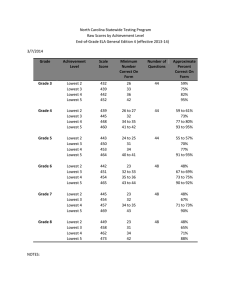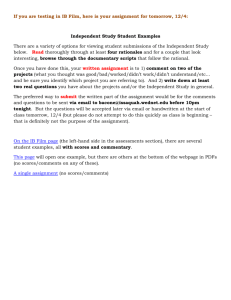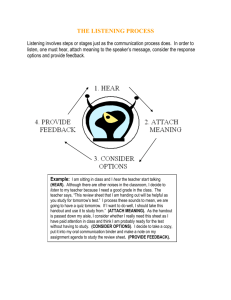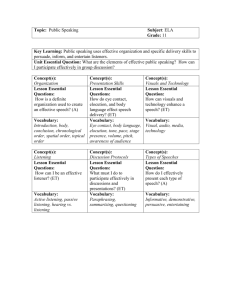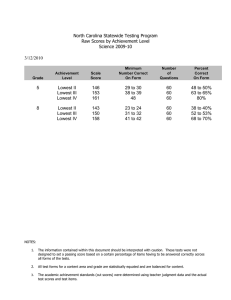Communications Tips for Teachers
advertisement
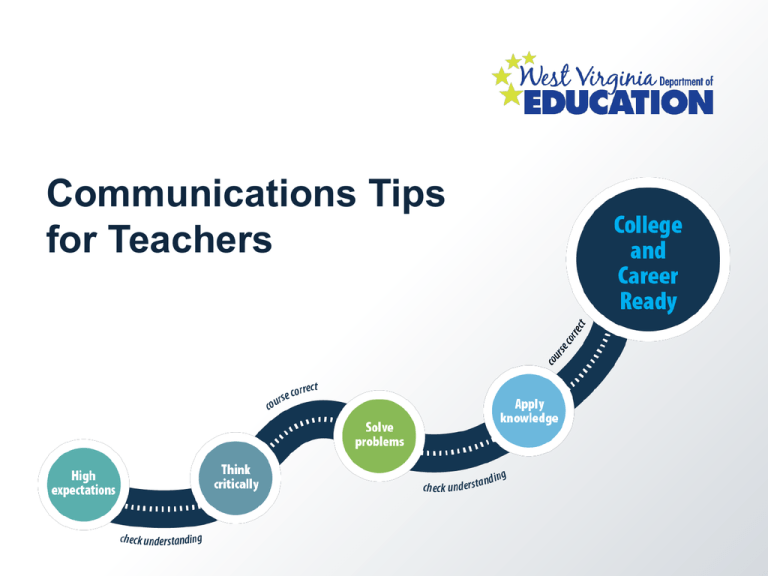
Communications Tips for Teachers Welcome! These tips were gathered from a variety of online resources available to help educators communicate about Common Core implementation and assessment. Current Situation • We’re in Transition • In this first year of testing parents and guardians will naturally have questions • Teachers are on the front line of parent communication • As the easiest person to ask for clarification and answers, teachers are in the hot seat • Teachers need clear responses to parent questions and concerns • Consistent messages help mitigate confusion and the ability of critics to use inconsistency to muddle and complicate the story. Effective Practices for Addressing Tough Questions Effective Practices • Anticipate Concerns – Practice Response • Be prepared • Acknowledge Concerns – Be Empathetic • It’s an adjustment for everyone • Remain Neutral • Keep tone congenial and body language friendly Effective Practices – the Hostile Questioner • Listen thoughtfully • Maintain eye contact • Stay relaxed • Set a reasonable tone • Rephrase the question using neutral words before responding • Share your experiences, if applicable – a personal story can diffuse tension Effective Practices – escalate if necessary • Refer unsatisfied parents to your principal Some Key Talking Points We’re Preparing for a New Future • Our students will live and work in the world of tomorrow • We had to update our curriculum to match the demands students will face • Tomorrow’s need? Workers who are: • Adaptable • Can apply knowledge to unpredictable problems • Can find information, assess its value and integrate it to arrive at creative solutions We’ve built up to this moment • Implementation of the new approach has been a process • Teachers have been learning new practices • The curriculum has been remodeled • Now the annual test will give us a measure of our progress The test is like your child’s regular check-up with the pediatrician • Provides a consistent check on progress - Is the student meeting expected milestones? • Allows teachers and parents to measure growth year to year • Provides information that teachers and parents can act on – is focused support needed? Tests provide Information • Information is used to show us where we need to improve teaching • Information is used to target support before students fall too far off track • The annual test is just one measure along with classroom projects and assessments Addressing Concerns about Time • Less than 1% of the school year is spent on the annual statewide test • Since the test measures the skills and knowledge we teach all year, there is no focus on test preparation • There’s no time limit – students have the time they need to show what they know and can do Talking Points – What’s New about the Test Assesses Desired Skills • Problem Solving Perseverance • Application of Knowledge • Listening • Reading Complex Texts • Research New Problem Types: More Engaging - 4th Grade Math Click and Drag animation New Problem Types: Challenging Tasks – 5th Grade Math “Analyze the class plan and determine an alternative that will help make the most of the available area “ • Drawn from real life • Requires multiple steps • No one right answer New Problem Types: Listening Questions – 7th Grade ELA Listen to the presentation Audio glossaries for words above grade level Asks students to provide evidence for answers Meaning in Context – 11th Grade ELA Choose the best two words to replace the underlined word More than one answer Unique Accessibility Features: Example - Pop Up Glossary Roll cursor over shadowed words – glossary pops up Unique Accessibility Features: Example - American Sign Language Videos Talking Points about Scores Results: Last Year’s vs. This Year’s It’s Like Apples and Oranges – you can’t compare The old test measured different skills Overall Scores – 2 Areas, 4 Levels English Language Arts and Mathematics Exceeded the Standard Met the Standard Nearly Met the Standard Has Not Met the Standard Above Standard At/Near Standard Below Standard Above Standard At/Near Standard Additional Scores – 3 levels, 8 topics English Language Arts 1. 2. 3. 4. Reading Writing Speaking & Listening Research/Inquiry Mathematics Below Standard 1. 2. 3. 4. Concepts & Procedures Problem Solving Communicating Reasoning Modeling & Data Analysis A Framework for Interpretation It’s a beginning– this year’s score is your baseline. It’s a transition – results may show fewer students have the skills right now, but we are on the right path. It’s the information we need – to help prepare kids for college and careers. Practice Role Plays
